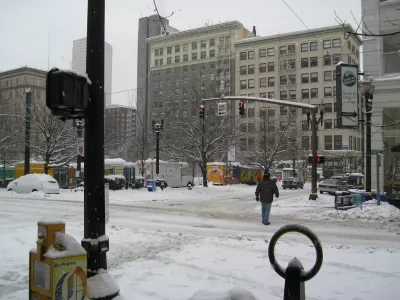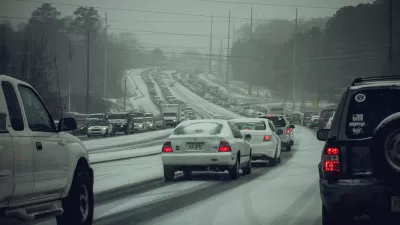Following in the footsteps of the "snowmageddon" events experienced by Atlanta in January 2014, Portland, Oregon had a surprising amount of difficulty with a small amount of snow this week.

Gillian Flaccus of the Associated Press shares news of the effects of a rare snowstorm in Portland, Oregon on Wednesday, December 14, 2016. The local story made the national news for its depiction of a crippled commute, abandoned cars, and closed schools.
Picking up the news for Bike Portland, Jonathan Maus contributed a critical perspective about why the day went so wrong.
Here’s the inconvenient truth: Our over-reliance on single-occupancy motor vehicle use has real consequences. It leads to lots of injuries and deaths, it poisons our lungs, and it makes our transportation system extremely fragile and inefficient.
To further that point, Maus shared an infographic illustrating the "Hierarchy of Mobility Resiliency." At the top "Feet." At the bottom "Cars." Maus's argument comes as a response to an article by The Oregonian, neglecting Maus's point but laying the blame on these five causes:
- Portland doesn't salt roads.
- Motorists don't carry chains.
- Drivers aren't experienced in snowy conditions.
- Portland doesn't have many snow plows.
- Transit doesn't reach to many parts of the city.
Also writing for The Oregonian, Lizzy Acker found enough good humor to scour social media for snarky takes on the whole bad snow day.
While Portland's considering how this snow storm had such a crippling effect on the city, it might want to consider the example of Atlanta, which was shut down for several days in January 2014 by just a few inches of snow. The event, dubbed "snowmaggedon," was also described by many commentators as a result of auto dependency.
FULL STORY: Winter Storm Snarls Portland Traffic, Stranding Thousands

Maui's Vacation Rental Debate Turns Ugly
Verbal attacks, misinformation campaigns and fistfights plague a high-stakes debate to convert thousands of vacation rentals into long-term housing.

Planetizen Federal Action Tracker
A weekly monitor of how Trump’s orders and actions are impacting planners and planning in America.

Chicago’s Ghost Rails
Just beneath the surface of the modern city lie the remnants of its expansive early 20th-century streetcar system.

Bend, Oregon Zoning Reforms Prioritize Small-Scale Housing
The city altered its zoning code to allow multi-family housing and eliminated parking mandates citywide.

Amtrak Cutting Jobs, Funding to High-Speed Rail
The agency plans to cut 10 percent of its workforce and has confirmed it will not fund new high-speed rail projects.

LA Denies Basic Services to Unhoused Residents
The city has repeatedly failed to respond to requests for trash pickup at encampment sites, and eliminated a program that provided mobile showers and toilets.
Urban Design for Planners 1: Software Tools
This six-course series explores essential urban design concepts using open source software and equips planners with the tools they need to participate fully in the urban design process.
Planning for Universal Design
Learn the tools for implementing Universal Design in planning regulations.
planning NEXT
Appalachian Highlands Housing Partners
Mpact (founded as Rail~Volution)
City of Camden Redevelopment Agency
City of Astoria
City of Portland
City of Laramie



























